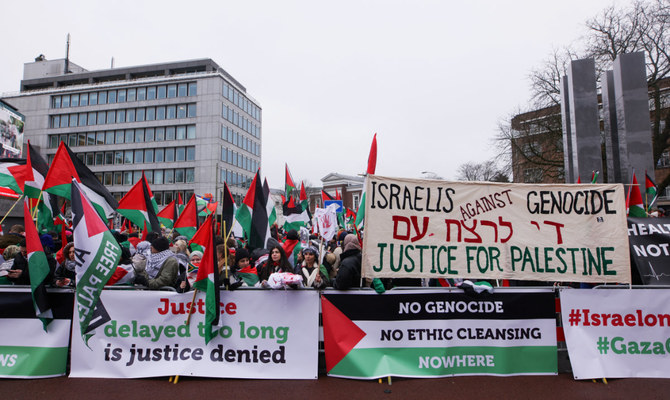
- ARAB NEWS
- 05 Jul 2025

It is known that one of the biggest challenges, when attempting to blame any country for acts of genocide, is the need to prove that the country’s leaders — both political and military — had both the intent to commit genocide and that this is what happened on the ground.
While the second part is relatively easy to prove, thanks to digital imagery in the form of videos and photographs, the intent is generally very difficult to prove.
Perhaps the most powerful and telling aspect of last week’s South African presentation at the International Court of Justice, where it has accused Israel of committing genocide in its war on Gaza, was the public statements made by Israeli officials and the videos of Israeli soldiers internalizing them. South Africa’s written report included nine pages on the issue of intent.
In the case of Israel, proving the genocidal intent of its war on the Palestinians of Gaza has been made easier due to the public statements made by Israeli officials that declare this very goal. Many public pronouncements specifically calling for the annihilation of Palestinians have been made since the Oct. 7 attack by Hamas and they are naturally still available online. Modern technology serves as both a perpetuator, allowing officials to address the people, and a digital smoking gun for the accusers that cannot be easily denied.
What the South African legal team was able to do in a relatively condensed time frame during its oral presentation was make the connection between the words spoken by senior Israeli political and military officials and the way the troops understood those words.
For its part, Israel has tried a variety of ways to rebut these arguments, including the admission that, while many of the statements were “obscene,” they did not amount to calls for genocide. Its argument focuses on two pillars: that the statements were either not made by senior officials or that they were not specific orders issued by the military or the war council.
Article 2 of the 1948 Genocide Convention defines genocide as “any of the following acts committed with intent to destroy, in whole or in part, a national, ethnical, racial, or religious group: killing members of the group; causing serious bodily or mental harm to members of the group; deliberately inflicting on the group conditions of life calculated to bring about its physical destruction in whole or in part; imposing measures intended to prevent births within the group; forcibly transferring children of the group to another group.”
While the best way to show genocidal intent is to obtain evidence of orders made by the defendant or someone the defendant works for up the chain of command, another way is to show a clear pattern of actions that would inevitably result in a group’s destruction. Intentions can be difficult to ascertain but they may be discernible in propaganda, hate speech or in state policies.
The intent to destroy can be manifested in widespread discriminatory practices that culminate in gross violations of the human rights of a specific group. The intent to destroy can also be inferred from the widespread or systematic nature of acts and the type of weapons employed.
Many public pronouncements specifically calling for the annihilation of Palestinians have been made.
Daoud Kuttab
The South African team did not mince its words. Israel has “genocidal intent against Palestinians in Gaza,” it told the International Court of Justice. Adila Hassim, representing South Africa, told the court: “Israel has subjected Gaza to what has been described as one of the heaviest conventional bombing campaigns in the history of modern warfare.”
The South African team admitted that genocides are never declared in advance, “but this court has the benefit of the past 13 weeks of evidence that shows, incontrovertibly, a pattern of conduct and related intention that justifies a plausible claim of genocidal acts,” Hassim explained.
Tembeka Ngcukaitobi, a brilliant lawyer for the High Court of South Africa, was very clear when he addressed the court, insisting that Israel’s intent was evident “from the way in which this military attack is being conducted.” Ngcukaitobi said there had been “reiteration and repetition of genocidal speech throughout every sphere of the state in Israel,” such that “the evidence of genocidal intent is not only chilling but also overwhelming and incontrovertible.”
Ngcukaitobi noted that Israeli Prime Minister Benjamin Netanyahu had twice recalled a biblical story that referred to what the prophet Samuel told King Saul. In it, Samuel tells Saul that God says: “I will punish the Amalekites for what they did to Israel when they waylaid them as they came up from Egypt. Now go, attack the Amalekites, and totally destroy all that belongs to them. Do not spare them; put to death men and women, children and infants, cattle and sheep, camels and donkeys.” The South African lawyer noted that Netanyahu said to his soldiers: “You must remember what Amalek has done to you, says our holy Bible. And we do remember.”
In a follow-up to this genocidal call by the Israeli commander-in-chief, a video of dancing Israeli soldiers with their guns held high was shown. They repeatedly chanted that they understood the command and that they knew what to do.
Israel’s top political officials, including the prime minister, president and defense minister, as well as various others down the line, have all spoken in terms of the need to annihilate the Palestinians and make Gaza unlivable. This is what has happened in the past three months. The intent to commit genocide, as well as the actual execution of it, have been proven beyond doubt at the International Court of Justice.
• Daoud Kuttab, an award-winning Palestinian journalist, is a director of Community Media Network.
X: @daoudkuttab